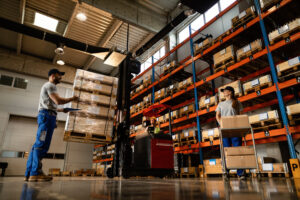
Technology, and Customer Satisfaction
At the core of these strategies lies the ability to understand customer demands and respond to them swiftly. These strategies include inventory management, demand forecasting, optimization of delivery processes, and route planning. To increase customer satisfaction, it’s necessary to have the right product at the right time and place. Advancing technologies, particularly artificial intelligence, data analysis, and the Internet of Things (IoT), support this process by providing more accurate results in inventory management and demand forecasting. For example, advanced data analysis can quickly detect changes in consumer behavior, allowing stock levels to be adjusted accordingly. Additionally, as part of efficient distribution, automating logistics processes ensures faster and more effective distribution of fast-moving consumer goods. This technological integration reduces costs and speeds up delivery processes, thereby increasing customer satisfaction.
 Sustainability and Efficient Distribution
Sustainability and Efficient Distribution
Sustainability is also of great importance. Nowadays, businesses strive to reduce their environmental impact and create a greener supply chain. Efficient distribution strategies focus on reducing the carbon footprint, lowering energy consumption, and waste reduction methods. For instance, more efficient route planning and the use of electric or hybrid vehicles help reduce the environmental impact of the logistics sector. Additionally, reducing packaging materials and promoting recycling supports the sustainability aspect of efficient distribution.
In the FMCG sector, efficient distribution is a factor that directly affects the success of businesses. By quickly meeting customer demands, effectively using technology, and adopting sustainable practices, businesses can gain a competitive advantage and strengthen their position in the market. Efficient distribution, at the heart of logistics and inventory management, enhances the quality, accessibility, and environmental impact of products reaching consumers. This approach contributes to the long-term sustainability and market success of businesses.



